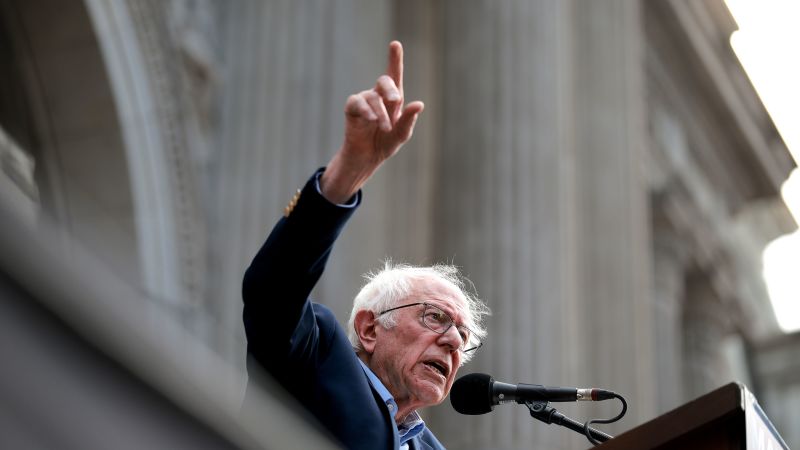Senator Bernie Sanders has made headlines with his recent remarks regarding the redistricting plans of Texas Republicans, which he perceives as an effort by former President Donald Trump to manipulate the electoral system. He contends that Democratic governors have “no choice” but to take action by redrawing congressional maps in response to these tactics. Sanders characterized the current political landscape as detrimental, asserting, “What we have now is a terrible situation, and Republicans are making it worse.” During his interview with Dana Bash on CNN’s “State of the Union,” Sanders emphasized that it is essential for Democrats to respond actively to the strategies employed by Republicans.
In his interview, which coincided with a leg of his “Fighting Oligarchy” tour, Sanders highlighted the ongoing standoff in Texas, where Democratic state representatives have departed to prevent Republicans from moving forward with their redistricting plan designed to gain five additional Republican seats in the U.S. House. He acknowledged that while he has long opposed gerrymandering, the current situation demands that Democrats effectively respond to Republican actions. Sanders argued that sitting idly while the system is being manipulated is not an option.
The progressive senator underscored, “(Trump) is trying to, you know, in his authoritarian way, say, ‘Hey, I don’t want to lose elections. Let’s rig the system.’” This statement captured the urgency of the situation and indicated his belief that Democrats must adopt a defensive posture to protect their electoral prospects. Sanders expressed frustration at the notion of Democrats merely surrendering to an unfair political process rather than fighting back.
With a focus on mobilizing supporters against the Trump administration, Sanders’s tour has included rallies nationwide, often featuring prominent figures such as Representative Alexandria Ocasio-Cortez and former presidential candidate Beto O’Rourke. Speaking in Wheeling, West Virginia—a state that voted heavily for Trump—Sanders articulated the notion that the Democratic Party has neglected its traditional base of working-class individuals. He was particularly critical of Vice President Kamala Harris, suggesting that her campaign has been heavily influenced by wealthy donors.
Although Sanders described Harris as “a friend of mine,” he expressed concern that her strategic advisors are overly aligned with affluent interests. He posed a pressing question regarding the Democratic agenda for the upcoming presidential campaign: “How do you run for president and not develop a strong agenda which speaks to the economic crisis facing working families?” His concerns reflect the growing income and wealth disparity in America, which he believes represents one of the most pressing issues of contemporary politics.
Sanders believes that the pathway to Democratic victories lies in a steadfast commitment to the working class. This assertion comes in the wake of a recently published CNN poll indicating the Democratic Party’s favorability is at an all-time low, further underscoring the urgency of Sanders’s message. Interestingly, he pointed out that, although he ranks third among the most recognized Democratic leaders, he remains hesitant about a potential run for the presidency in 2028 due to his age.
However, Sanders reassured supporters that there will “absolutely” be a candidate to champion the progressive agenda in the next election cycle. While he refrained from naming potential successors, he conveyed optimism about the emergence of capable young leaders within the party.
Turning to Republican dynamics, Sanders commented on Trump’s suggestion that Vice President JD Vance could carry forward the “MAGA” movement, conveying indifference to who leads the GOP in 2028. He contended that modern Republicans have little to offer the working class, reinforcing his belief in the need for a more robust and worker-oriented Democratic policy platform.
On global issues, Sanders criticized the Trump administration’s intentions concerning military aid to Israel amidst the ongoing humanitarian crisis in Gaza. While acknowledging Israel’s right to defend itself, he condemned its actions against Palestinian civilians, stating that their military response has targeted the entire Palestinian population. Sanders’s advocacy reflects his commitment to a more principled U.S. foreign policy, particularly regarding military aid and human rights.
Moreover, Sanders openly expressed his disdain for Russian President Vladimir Putin, labeling him as a “really awful guy.” He expressed concern over the impact of the war in Ukraine, asserting that the crisis underscores the dire consequences of oligarchic rule and imperial ambitions. Nonetheless, Sanders indicated that he would support any peace agreement that considers the priorities of the Ukrainian people, emphasizing the need for diplomacy that aligns with their interests.
By advocating for substantive political action and a moral approach to foreign policy, Sanders’s recent engagements highlight his dedication to the values of equity and social responsibility both domestically and internationally. His standing on these issues strains against the status quo, positioning him as a key figure in the contemporary political landscape as various complex crises unfold.











